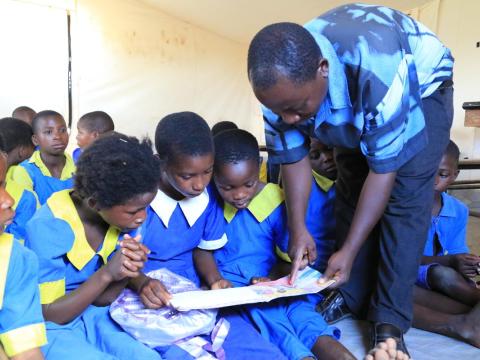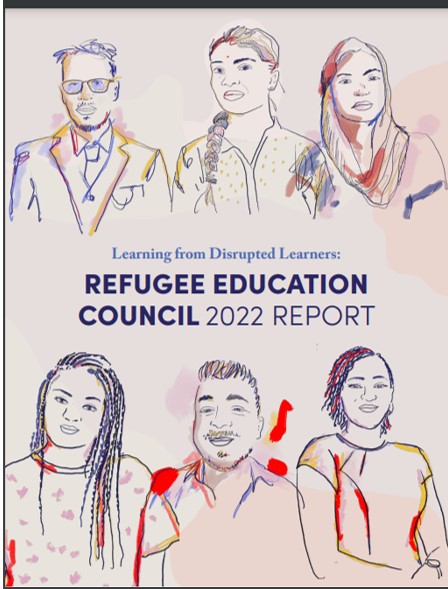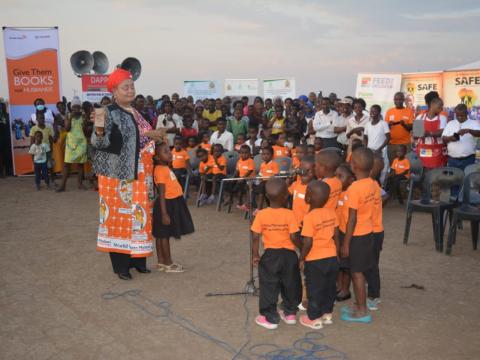
Education sparks transformation
By Michael Messenger, President and CEO of World Vision Canada, and the Civil Society Constituency representative of the Education Cannot Wait High-Level Steering Committee
7 February, 2023
Education is in crisis. Globally, 222 million children and adolescents who live in the most dangerous places urgently need educational support to keep learning and realize their potential. Plus, COVID-19, conflict and climate change have combined to intensify the crisis.
At the Transforming Education Summit I attended in September 2022, Education Cannot Wait (ECW), the largest global fund for education in emergencies, launched an ambitious new strategy to address this crisis. ECW’s 2023-2026 Strategic Plan outlines how to fulfil the right to inclusive, quality education for crisis-affected children, including refugee and internally displaced children and youth.
It’s an ambitious plan, but the benefits of educating children are incalculable.
Education can unlock human potential, empower children, shift the balance of gender equity and even save lives. Education is essential – especially for the most vulnerable children, those who are living in conflict zones. As Yasmine Sherif, Director of ECW, says, “education is the very foundation for all human rights.”
ECW’s plan aligns well with World Vision Canada’s mission to help the most vulnerable children overcome poverty and experience fullness of life. World Vision Canada supports education for children living the most dangerous places, working with the Canadian government and NGOs to deliver programs and insights. In 2021 alone, we invested $42 million across 111 projects that focused primarily on education.
These are four of our key education-related initiatives and how we’re making an impact on children and young people’s futures:
IMAGINE (Improving Adolescent Girls’ Inclusive Education) Grant - World Vision is an implementing partner of the Government of Canada’s IMAGINE consortia grant in Mali. Since January 2020, we’ve been working to dismantle barriers to girls attending school in a challenging, conflict-affected context -- economic and political insecurity, attacks on schools and teachers, high rates of child marriage and COVID-19 -- and helping them to thrive once they arrive.
EGAL (Equality for Girls’ Access to Learning) Grant – World Vision is leading on this Government of Canada grant in the Democratic Republic of Congo, now completing three years (2020-2023) of successful interventions in the fragile post-conflict context of Kasai Centrale province. EGAL addresses barriers to access for vulnerable girls who were out of school due to displacement, conflict, early marriage and mental health issues, and works with communities to improve attitudes and norms towards a girl’s right to an education.
Refugee Education Council - World Vision hosts the Refugee Education Council, an advisory body composed of 15 outstanding young leaders with lived experience as refugee and displaced peoples from around the world. The council was funded by a Global Affairs Canada grant and supported by the Canadian International Education Policy Working Group (CIEPWG), an umbrella organization of Canadian NGOs.

Learning from disrupted learners: A new anthology from the Refugee Education Council
Education Cannot Wait - As the Civil Society Constituency representative of ECW’s High-Level Steering Committee, I’m attending the High-Level Financing Conference on Feb. 16-17 in Geneva where ECW hopes to raise at least $1.5 billion from world leaders, businesses, foundations and high net-worth individuals to address a widening gap in access to education in crisis.
In Canada, through our work supporting the Refugee Education Council, we’ve followed the guidance of refugee and displaced young leaders in advocating for global decision-makers in education to take meaningful action and ensure that education is both inclusive of and informed by young people. As part of this work, we have championed recommendations and commitments led by young advocates such as the TES Youth Declaration and Together for Learning Outcome Summary. As we anticipate the release of the 2023 Federal Budget this spring, World Vision has also joined CIEPWG to raise awareness for the need for increased investment in education funding to multi-lateral and civil society partners through a petition.
On a personal level, I’ve always prized my own education and am so grateful that my children have had the same opportunities. I remember years ago reading Goodnight Moon by Margaret Wise Brown and then The Chronicles of Narnia by C.S. Lewis to the kids before bed. I remember packing lunches for them each morning and hearing about their learning adventures each evening when they were young – what a blessing! My daughter, Annie, is now in graduate school.
On the other hand, children who have been ripped away from their homes due to conflict or natural disaster face many barriers to education. But in some ways, education is even more crucial for these children. No matter the context – in displaced people settlements in Central African Republic, refugee camps in Jordan, or transit facilities on the Romania/Ukraine border – children always tell their number one hope: to return to school. These girls and boys want an education because they know it’s the spark that will change their futures. It’s the transformative opportunity that we can provide if we work together.
You can help fund the ECW strategic plan by signalling to your government representatives the importance of education in emergencies. Or start small by just sharing this blog.
Michael Messenger is President and CEO of World Vision Canada, and the Civil Society Constituency representative of the Education Cannot Wait High-Level Steering Committee.
